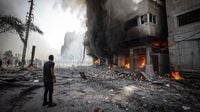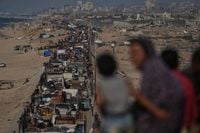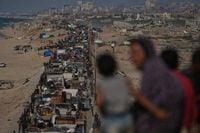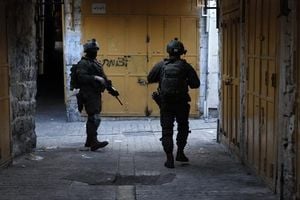On Tuesday, September 23, 2025, the Palestinian Medical Relief Society announced that its main health center in Gaza City had been destroyed by an Israeli airstrike, following an evacuation order. The six-story building, located in the Tel al-Hawa neighborhood (referred to in some reports as the central Samer area), was left in ruins, marking a devastating blow to one of the city’s primary medical facilities. According to the charity, this center had provided essential services, including blood donation and testing, trauma care, cancer treatments, and chronic disease management—services that are now all but inaccessible to many Gazans.
The destruction of this facility comes amid a broader Israeli military offensive in Gaza City, the largest urban area in the territory. As reported by the Associated Press and other outlets, the Israeli military did not immediately comment on the strike. However, the incident is part of a pattern: hospitals and medical centers across Gaza have been repeatedly bombed and raided during the ongoing conflict, with multiple hospitals forced to shut down as Israeli forces advance through the city.
Israel has long accused Hamas of using medical facilities for military purposes, arguing that such actions could strip these sites of their protected status under international law. Yet, as noted by the BBC and other sources, the Israel Defense Forces (IDF) has often provided little or no concrete evidence to support claims of a significant militant presence in these facilities. This has become a point of contention in the international community, with many humanitarian organizations and governments questioning the proportionality and justification of such strikes.
The humanitarian impact is staggering. The World Health Organization (WHO), which has partnered with the Palestinian Medical Relief Society, condemned the attack in the strongest terms. "Attacks on health facilities must end. The senseless violence must stop. Ceasefire!" wrote WHO Director-General Tedros Adhanom Ghebreyesus on X, formerly Twitter. His plea echoes a growing chorus of international voices demanding an end to hostilities and the protection of medical infrastructure.
The destroyed center was not the only casualty. The charity reported that another of its medical centers was damaged and surrounded by Israeli troops, while a third facility was destroyed in a separate strike. The cumulative effect of these attacks has been to severely limit access to medical care for the city’s residents, many of whom are already struggling under dire conditions.
On Monday, September 22, Gaza’s Health Ministry announced that two major hospitals—the Al-Rantisi Children’s Hospital and the Specialized Eye Hospital—had been forced to close due to nearby Israeli military operations. The closures have left countless patients, including children and those with chronic illnesses, without critical care. The Health Ministry, which is part of the Hamas-run government, stated that at least 65,382 Palestinians have been killed in the war as of September 2025. While these figures do not distinguish between civilians and combatants, they are widely regarded by the United Nations and independent experts as the most reliable estimates available.
The war in Gaza was triggered by a Hamas-led attack on southern Israel on October 7, 2023, in which approximately 1,200 people—mostly civilians—were killed and 251 taken hostage. Israel launched a major offensive in response, with the stated aim of pressuring Hamas to surrender and securing the release of the remaining hostages. As of September 2025, Israel believes that around 48 hostages are still being held, with approximately 20 thought to be alive.
The consequences of the conflict have been catastrophic for Gaza’s civilian population. According to UN agencies and aid groups, more than 300,000 people have fled Gaza City in recent weeks, following Israeli orders to move south. Despite this mass displacement, an estimated 700,000 residents remain in the city, many of them facing extreme shortages of food, water, and medical supplies. The world’s leading authority on hunger crises reported last month that Israel’s blockade and ongoing offensive had already pushed Gaza City into famine conditions—a situation that is only likely to worsen as medical facilities are systematically destroyed or rendered inoperable.
The international response has been swift, if not always effective. On Monday, September 22, 2025, 24 Western countries—including Canada, France, and Germany—issued a joint statement calling on Israel to restore a medical corridor, allowing Palestinians in Gaza to receive treatment in east Jerusalem and the West Bank. The statement also demanded that Israel lift restrictions on the entry of medical supplies into Gaza. These calls reflect mounting criticism of Israel’s conduct in the war, even among some of its closest allies. According to Reuters, the closure of the Allenby Bridge Crossing—the only border crossing between the occupied West Bank and Jordan that does not lead to Israel—has further complicated efforts to deliver humanitarian aid and evacuate the sick and wounded.
The blockade and the ongoing military campaign have left Gaza City in a state of siege. Multiple hospitals have been forced to close their doors, and those that remain are stretched to the breaking point. The loss of the Palestinian Medical Relief Society’s main center is particularly acute, as it was a lifeline for thousands of patients requiring specialized care. The charity’s staff and volunteers, many of whom have risked their lives to continue providing services, now face the grim reality of operating in a city where medical infrastructure is rapidly disappearing.
Israel maintains that its operations are necessary to defeat Hamas and secure the release of hostages. Nevertheless, the lack of evidence for militant activity in targeted medical facilities, coupled with the mounting civilian death toll, has fueled international outrage and raised serious questions about the proportionality of Israel’s actions. The United Nations and various human rights organizations have repeatedly called for independent investigations into potential violations of international humanitarian law.
For Gaza’s residents, the immediate concern is survival. With food and water scarce, and medical care increasingly out of reach, the destruction of yet another health center represents not just the loss of a building, but the loss of hope for many. As the conflict grinds on, the humanitarian crisis deepens, and the calls for a ceasefire grow ever more urgent.
In the midst of war, the fate of Gaza’s hospitals and medical centers has become a barometer for the broader tragedy unfolding in the territory. Each destroyed facility is a stark reminder of the human cost of conflict—and of the urgent need for a solution that prioritizes the lives and dignity of civilians above all else.






